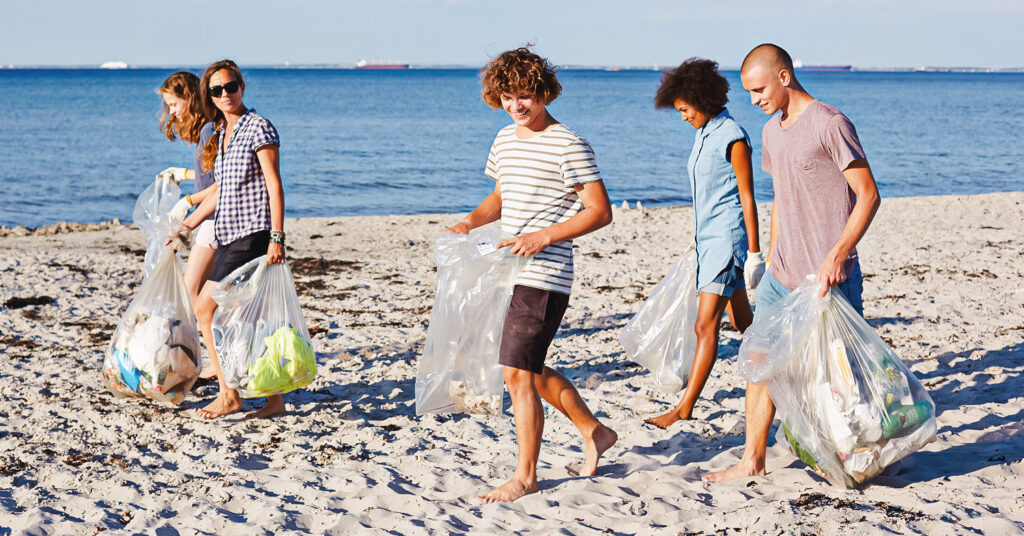More than 70 percent of the planet’s surface is covered by water. But the ocean provides more to humans than just a scenic summertime escape.
The ocean produces at least 50 percent of the Earth’s oxygen and it supports an incredible amount of marine biodiversity. In its vast depths reside a myriad of species—an estimated 91 percent of which have yet to be classified, according to the U.S. National Ocean Service.
What Is World Oceans Day?
Celebrated annually on June 8, World Oceans Day is an international day of action geared towards protecting the ocean and all of its inhabitants.
Canada’s International Centre for Ocean Development and the Ocean Institute of Canada first proposed World Oceans Day in 1992 at the Earth Summit in Rio de Janeiro, Brazil. And the United Nations (U.N.) officially recognized the international day in 2008. In 2016, the World Ocean Day Youth Advisory Council was formed to connect youth around the globe in taking action for the oceans.
This year’s theme for World Oceans Day is “The Ocean: Life and Livelihoods”. This year also kicks off the U.N.’s Decade of Ocean Science for Sustainable Development. According to the U.N., the initiative “was born out of the recognition that much more needs to be done to reverse the cycle of decline in ocean health and create improved conditions for the sustainable development of the ocean, seas and coasts.”
Conceived in 2017, the Decade of Ocean Science will run from 2021 until 2030. It will bolster innovative technologies and scientific research aimed at reversing the decline in ocean health.

Why Are Oceans In Danger?
The oceans face a number of challenges these days, largely due to human activity. Overfishing, pollution, offshore drilling, and global warming are all wreaking havoc on the deep blue sea.
Fishing comes with a catch. According to the U.N., about 90 percent of global marine fish stocks are overexploited, fully exploited, or completely depleted. And destructive fishing practices aren’t just harmful for the marine life that’s caught.
Overfishing can impact entire marine ecosystems, adversely affecting ocean biodiversity. As fish populations are depleted, natural food chains are disrupted, leading to a loss of other marine species, such as coral reefs and sea turtles.
But overfishing isn’t the only thing destroying the oceans. Trash is a big problem, too. The National Oceanic and Atmospheric Administration (NOAA) reports that billions of pounds of garbage and other pollutants make their way into oceans each year.
Marine pollution—in the form of garbage, plastic, toxic waste, and untreated sewage—is poisoning marine species, disrupting water cycles, and saturating the oceans with carbon dioxide, fueling global warming.
The climate crisis is heating things up—not just on land but in the ocean, too. As the ocean absorbs more heat, sea levels and surface temperatures are rising. According to the NOAA, ocean temperatures have increased by approximately 0.13°C each decade over the last century. The changes in temperature not only impact marine life but cause climate pattern alterations, such as stronger tropical storms.
How to Help The Ocean on World Oceans Day
For those looking to make a difference for the planet, what better day to take action for marine species and the world’s oceans than World Oceans Day? Here are five simple things you can do to help the oceans, today and each day after.

Eat less seafood
The Netflix documentary Seaspiracy exposed the devastating impacts of overfishing and aquaculture. The film explored a number of social justice issues prevalent in the fishing industry, including human slavery, ocean pollution, and animal cruelty.
For those looking to take the sustainable bite out of seafood, try eating less seafood. Or, simply don’t eat it at all. From crab cakes to caviar, there are now a multitude of vegan seafood brands on the market.

Go plastic-free
According to the International Union for Conservation of Nature, at least eight million tons of plastic winds up in oceans each year. Marine species ingest or become entangled in plastic waste. The plastic debris kills more than 100,000 marine mammals, as well as one million seabirds each year, reports the U.N. Educational, Scientific and Cultural Organization.
An easy way you can help reduce the amount of plastic winding up in oceans? Go plastic-free. Cut out single-use plastics as much as you can and opt for reusable plastic or plastic-free products, instead. Some easy plastic-free swaps include reusable metal straws, biodegradable cutlery, and reusable grocery bags.

Spread the message
Raise awareness for the ocean’s most pressing issues on social media—share your articles, facts, documentaries, and more with your friends and family. This year, WorldOceanDay.org is urging world leaders to safeguard at least 30 percent of the Earth’s oceans by 2030. You can support the campaign, called 30×30, online using the organization’s toolkit.

Participate in an event
In addition to speaking out on social media, you can take action for the oceans by participating in an ocean/beach cleanup. You can conduct a simple Google search to find beach cleanups in your area.

Support charities, organizations, and causes
And last but not least, in addition to volunteering your time with a relevant organization, you can also financially support a charity or organization doing amazing work for the oceans.
While many ocean charities and organizations promote sustainable fishing, the Sea Shepherd Conservation Society is one of the few non-profits that encourages veganism. The marine conservation organization has divisions all around the world working to protect the oceans from environmental destruction and illegal exploitation at the hands of humans. Other charities to support include Surfers Against Sewage and Lonely Whale, which fights plastic pollution, and Reef Check, which supports coral reef restoration. The Good Food Institute also has an alternative seafood initiative, which promotes plant-based and cultivated seafood products.
LIVEKINDLY is here to help you navigate the growing marketplace of sustainable products that promote a kinder planet. All of our selections are curated by the editorial team. If you buy something we link to on our site, LIVEKINDLY may earn a commission.


